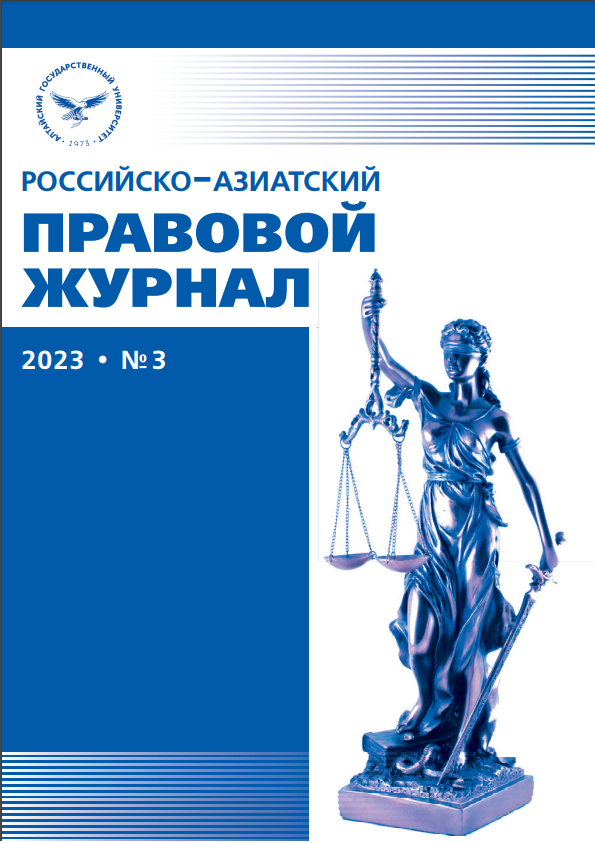AXIOLOGICAL SIGNIFICANCE OF THE PRINCIPLE OF HUMANISM IN CRIMINAL LAW
УДК 343 ББК 67.408
Abstract
Criminal law principles are the conceptual basis for the formation of an effective criminal law. In thecurrent Russian legislation, the principles have received normative consolidation, which is positive, theprinciples themselves in this regard should be the basis for the formation of criminal law norms. The authorof the work, using the integration method, studies the principle of humanism, both in general scientificand in a narrowly sectoral meaning, explores the axiological meaning of the principle of humanism. Theintegrative method in scientific research allows us to consider legal phenomena, processes, objects of legalregulation on the basis of methodological approaches of other sciences, not only the humanities, but alsousing mathematical methods, techniques of cybernetics. The article analyzes the criminal-legal significance of the principle of humanism from the perspective of the ratio of punishment and correction, as well as thepriorities of the implementation of the principle under consideration. The author identifies independentelements by means of which the axiological meaning of the principle of humanism is realized in modernRussian criminal law. Such elements include — content, structural, model.
Downloads
References
Сабитов Т.Р. Система уголовно-правовых принципов. М. : Проспект, 2012. С. 235.
Сумачев А.В. О принципах уголовного права // Юридическая наука и правоохранительная практика. 2017. №4. С. 8–16.
Пудовочкин Ю.Е., Пирвагидов С.С. Понятие, принципы и источники уголовного права: сравнительно-правовой анализ законодательства России и стран Содружества Независимых Государств. СПб. : Юрид. центр Пресс, 2003. 295 с.
Степашин В.М. Понятие принципа уголовного права // Вестник Омского университета. Серия: Право. 2017. №1. С. 192–195.
Бавсун М.В. Методологические основы уголовно-правового воздействия : монография. М. : Юрлитинформ, 2012. 197 с.
Байниязова З.С. Основные принципы российской правовой системы : автореф. дисс. … канд. юрид. наук. Саратов, 2004. 26 с.
Келина С.Г., Кудрявцев В.Н. Принципы советского уголовного права. М. : Наука, 1988. 176 с.
Коренная А.А. Принципы уголовно-правовой охраны экономической деятельности как концептуальная основа реформирования уголовного закона // Известия Алтайского государственного университета. 2017. №3 (94). С. 67–71.
Выжлецов Г.П. Аксиология в системе философского знания // Вестник Санкт-Петербургского университета. Международные отношения. 2010. №4. С. 34–39.
Масаев М.А. Гуманизм в системе правовых принципов: некоторые исходные положения // Мир политики и социологии. 2016. №4. С. 73–80.
Мальцев В.В. Принцип гуманизма в уголовном законодательстве // Российская юстиция. 2002. №7. С. 51–53.
Ююкина М.В. Принцип гуманизма в уголовном, уголовно-исполнительном праве и уголовной политики и его реализация при назначении наказания : дисс. … канд. юрид. наук. Тамбов. 2006. 230 с.
Бочкарев С.А. Квазиценность современного учения об объекте преступления // Российский журнал правовых исследований. 2015. №3. С. 125–132.
Шамбуров С.А., Васильев Н.Г. Эвристические возможности аксиологического подхода в правовых исследованиях // Проблемы современного российского законодательства : материалы 4-й Всерос. науч.-практ. конф. / отв. ред. С.И. Суслова. Иркутск : Иркутский институт (филиал) ВГУЮ (РПА Минюста России), 2015. С. 72–75.
Побегайло Э.Ф. О криминологической обоснованности изменений в Уголовный кодекс РФ // Российское уголовное право: традиции, современность, будущее / под ред. Н.М. Кропачева, Б.В. Волженкина. СПб. : Юрид. центр Пресс, 2005. С. 54–63.
Russian-Asian Law Journal is a golden publisher, as we allow self-archiving, but most importantly we are fully transparent about your rights.
Authors may present and discuss their findings ahead of publication: at scientific conferences, on preprint servers, in public databases, and in blogs, wikis, tweets, and other informal communication channels.
Russian-Asian Law Journal allows authors to deposit manuscripts (currently under review or those for intended submission) in non-commercial, pre-print servers such as ArXiv.
Authors who publish with this journal agree to the following terms:
- Authors retain copyright and grant the journal right of first publication with the work simultaneously licensed under a Creative Commons Attribution License that allows others to share the work with an acknowledgement of the work's authorship and initial publication in this journal.
- Authors are able to enter into separate, additional contractual arrangements for the non-exclusive distribution of the journal's published version of the work (e.g., post it to an institutional repository or publish it in a book), with an acknowledgement of its initial publication in this journal.
- Authors are permitted and encouraged to post their work online (e.g., in institutional repositories or on their website) prior to and during the submission process, as it can lead to productive exchanges, as well as earlier and greater citation of published work (See The Effect of Open Access).








